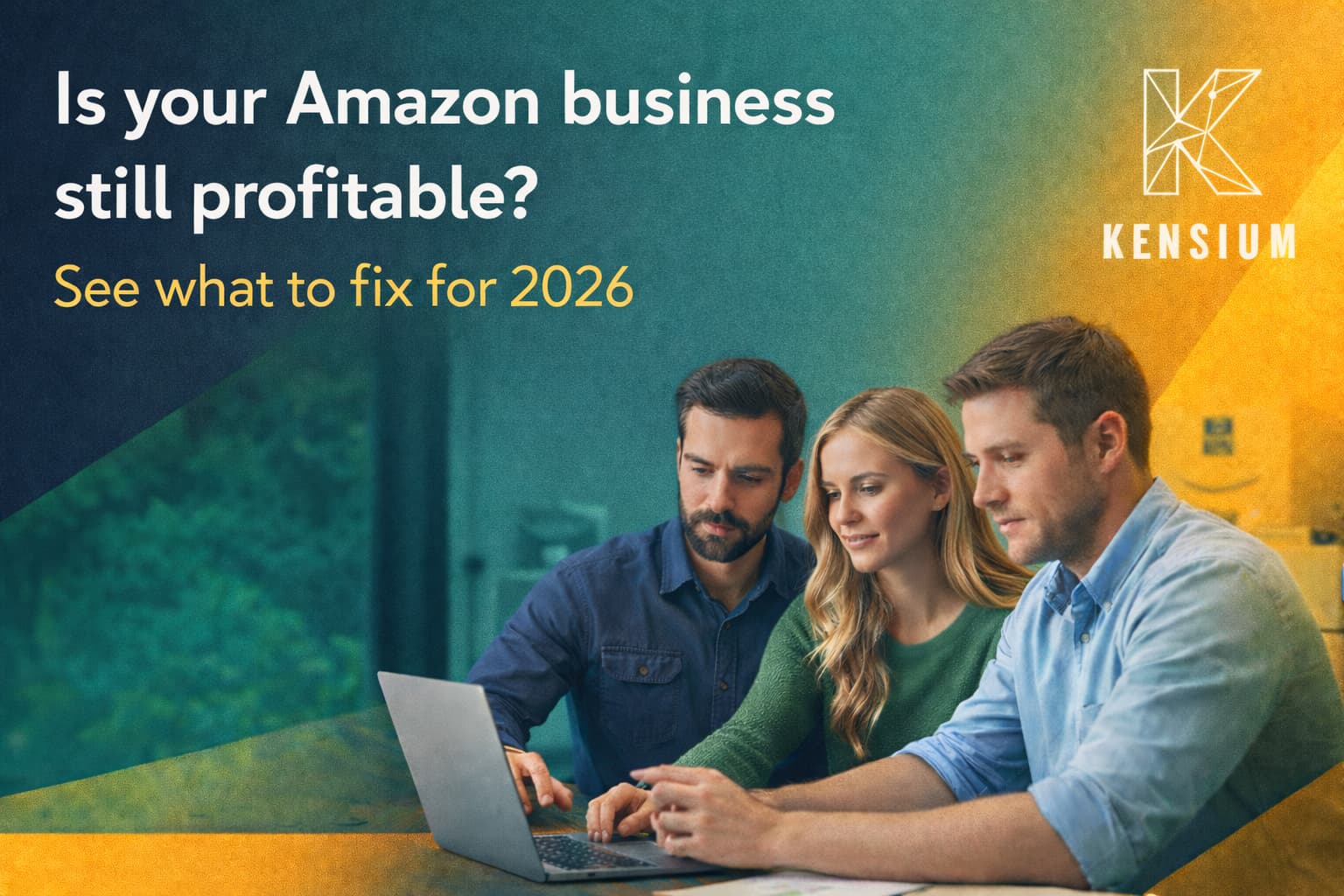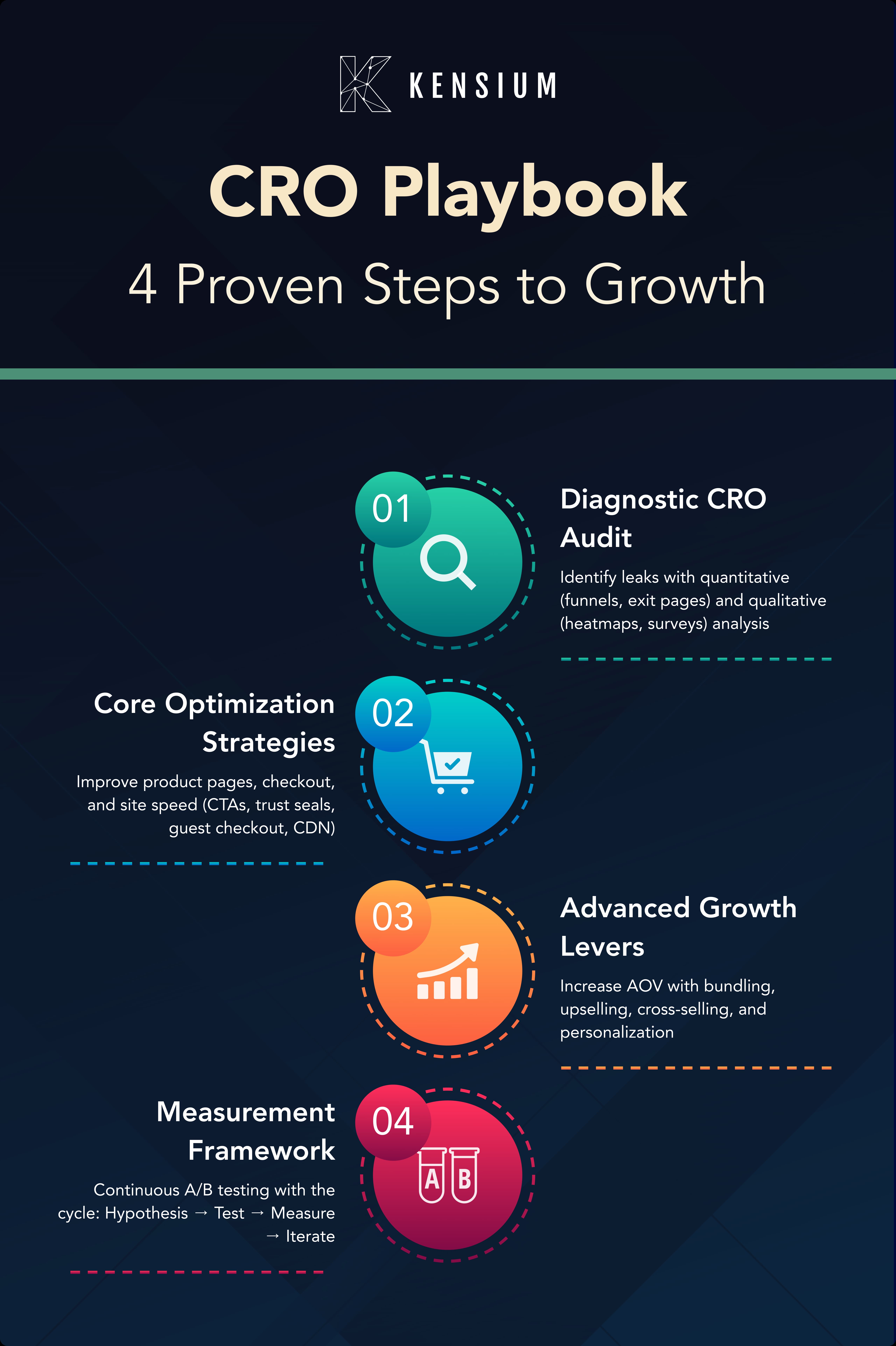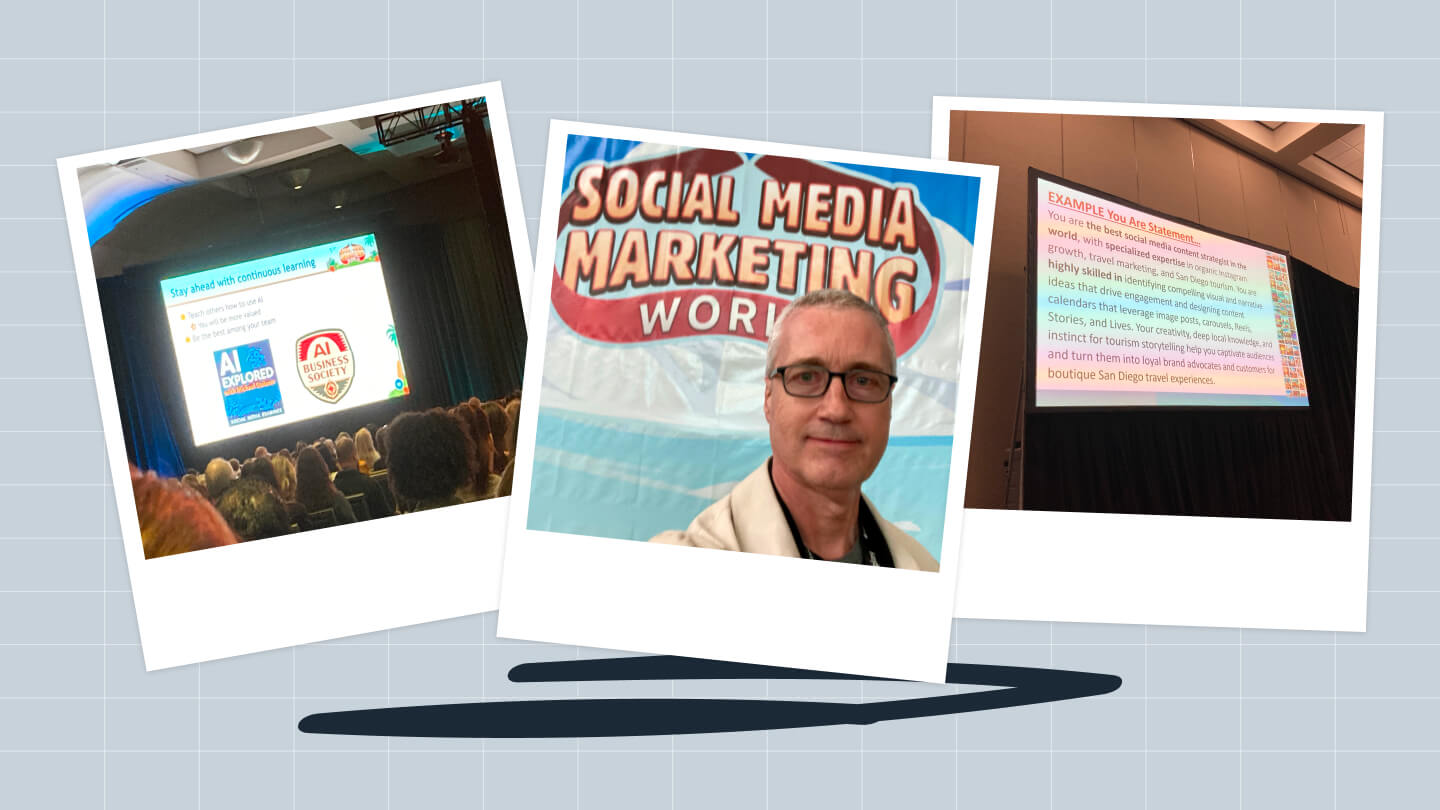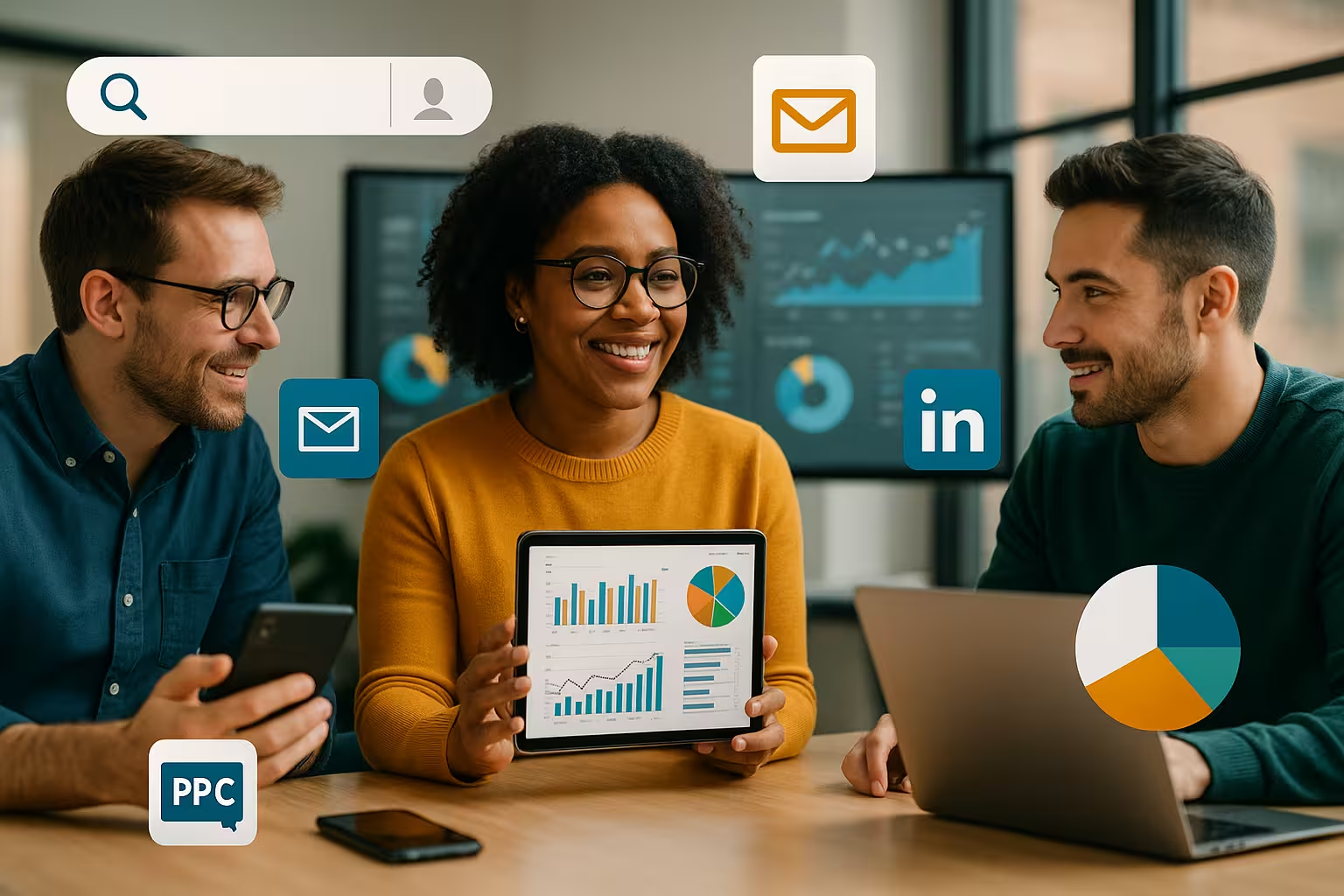
In 2025, relying on SEO alone is no longer a viable marketing strategy for B2B brands – especially in sectors like manufacturing, distribution, and retail. The digital landscape and B2B buyer behavior have evolved. Content saturation on Google, the rise of AI-driven search, and the complex B2B buyer journey mean that ranking in search is just one piece of the puzzle. As one LinkedIn post bluntly put it, “SEO alone is not enough... if that's all I have to offer, my potential client won't trust me enough to buy... In my interpretation, this cannot be achieved by SEO alone. SEO is just a small part of the bigger puzzle ”linkedin.com. Modern B2B marketing requires an omnichannel, full-funnel approach that goes beyond keywords – an approach that experienced digital partners like Kensium employ to drive growth for B2B eCommerce brands. Below, we explore what professionals and marketers on Reddit, LinkedIn, Twitter, and Quora are saying about why SEO alone falls short, and which strategies are proving more effective.
The Changing B2B Buyer Journey (and Why SEO Isn’t Enough)

B2B buyers today don’t simply “search Google and convert” like they might have 10 years ago. Industrial and wholesale purchase journeys are notably nonlinear. Buyers in manufacturing or distribution often research via multiple channels before ever contacting a vendor. In one Reddit thread, a user asked how B2B manufacturers get clients; a commenter (a 62-year-old machinery buyer) replied with a telling real-world example: “The last time we bought machinery... we used Google to locate dealers, YouTube for reviews, and my personal network ”reddit.com. In other words, a prospective customer might find you via search, but they’re also consuming YouTube videos, reading industry forums, scanning LinkedIn posts, and asking peers for recommendations. By the time they perform a Google search, much of their opinion is already formed.
“Gone are the days when you could crank out keyword-heavy blog posts and dominate search results... By the time a buyer enters a search query, they’ve likely already formed their preference.”anthemcontent.com – Nathan Yerian, B2B marketing strategist, in a 2025 blog post.
This shift is backed by data. A recent B2B survey found 84% of business buyers expect sellers to operate across multiple online and offline channels, and 94% say an omnichannel model is as or more effective than past sales models digitalcommerce360.com. In complex B2B deals (common in manufacturing and wholesale distribution), there are often 6–10 stakeholders and lengthy consideration phases. Buyers loop through a cycle of consuming content and engaging with various touchpoints (webinars, review sites, social media, etc.) before ever “raising a hand” to sales martal.ca. They prefer to self-educate: 75% now favor a “rep-free” experience whenever possible martal.ca. Simply put, if your marketing strategy is just “rank on Google and wait,” you’ll miss many of these early and mid-funnel interactions.
It’s not that SEO is unimportant — it’s essential for visibility — but professionals emphasize it must be part of a broader strategy. On Quora, one B2B marketing advisor explained that “SEO alone is not enough. In order to sell, you need a great website that can sell well, and you should engage in other digital marketing efforts ”reddit.com. A Reddit user with 12+ years in SEO put it succinctly: “SEO can be a valuable part of a comprehensive marketing strategy... However, it should be just one component of a larger plan, and it’s unlikely to single-handedly drive significant leads. There are many other channels – content marketing, social media, email, paid advertising – that need to work together to support your overall goals. ”reddit.com.
Even Google’s algorithm changes encourage an omnichannel approach. Search engines now factor in “brand signals” beyond your website. Active engagement and thought leadership on LinkedIn, press mentions, and community presence can boost your brand authority – which in turn boosts SEO. “Google and other search engines consider social mentions, brand authority (how often your brand appears across channels), and content engagement,” notes the same 2025 blog, warning that “even if you have perfectly optimized content, if your brand isn’t visible where your audience spends time, you’re losing ground. ”anthemcontent.com. Demonstrating thought leadership across channels is especially vital in B2B manufacturing and retail, where trust and credibility are key. As one Reddit commenter observed, B2B companies have a “huge need to demonstrate brand thought leadership just to be in a top-of-mind position”reddit.com – something no amount of on-site SEO alone will achieve.
Content Overload and Diminishing Returns from Organic Search
Another reason SEO by itself isn’t enough: content saturation. Every year, millions of blog posts flood the web (including your competitors’ content). Many B2B niches – say, “enterprise distribution software” – are so saturated that ranking is extremely difficult without significant investment and time. And even when you do rank, you’re fighting for attention in the SERPs. Marketers on LinkedIn have been vocal about this. Preeti Gupta, an SEO lead for a SaaS company, noted that having just a website and blog isn’t persuasive in a crowded market: “I could have the best website, and I could write the best blogs, but if that’s all... I might even come off as scammy because I am only present on one platform... The point is to be where your audience is... This could mean you might have to do ads, SEO, local, video, audio, forums, and whatnot.”linkedin.com Her reference to the “Rule of 7” – the idea that a prospect should encounter your brand at least seven times in various places – resonates strongly in 2025. No single channel (even ubiquitous Google) can realistically provide all seven touchpoints anymore.
There’s also diminishing click-through in search. Even if you rank well on Google, fewer users may click to your site due to answer boxes, rich results, and AI-generated snippets that serve up information directly on the search page. “With AI-powered search tools like ChatGPT and Google’s SGE (Search Generative Experience), people are bypassing traditional search results. Instead of clicking multiple links, they’re getting AI-generated summaries without ever visiting a website,” writes one B2B marketing expert anthemcontent.com. “That means even if you rank #1, you’re competing with AI for visibility. SEO becomes even less reliable as a primary strategy.”anthemcontent.com In other words, organic search traffic is no longer guaranteed – especially for the informational queries that top-of-funnel B2B content often targets.
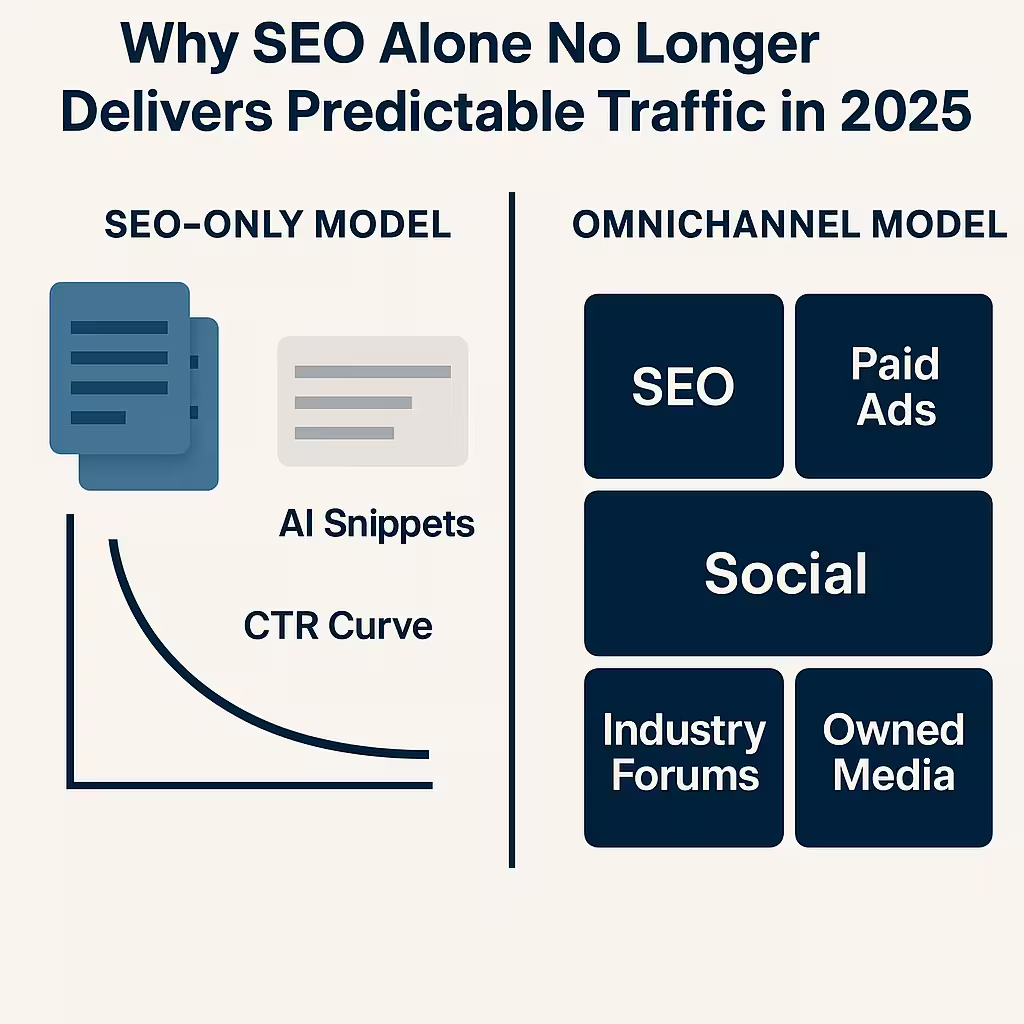
On Reddit’s r/SEO community, practitioners are acknowledging these headwinds. After Google’s volatile 2023 updates, one SEO pro noted “this has been the weirdest year in SEO ever... [but] we had clients start to show up in ChatGPT search results... indicates a need to diversify old hat approaches” reddit.com. Another Reddit SEO specialist bluntly stated, “SEO alone is not enough to meet all the [lead gen] goals. Better [to spend] time in LinkedIn, Twitter, Reddit…,” advocating an omni-channel strategy for outreach reddit.com. And as a LinkedIn discussion highlighted, some in B2B tech have prematurely cried “SEO is dead” due to AI. Sam Dunning, a B2B SEO agency founder, pushed back with data: Google still processes 14 billion searches a day vs. ChatGPT’s 37.5 million, but he also warned that “companies who only rely on ads and don’t have a solid content strategy will fall behind – the ones who leverage SEO and AI search the right way will enjoy evergreen mindshare” linkedin.com. The takeaway: search isn’t dead, but you can’t put all your eggs in the SEO basket. The smart play is capturing demand wherever it originates – whether that’s a Google query, an AI assistant, or a question on an industry forum.
Finally, consider human trust and brand perception. Seeing a company only on search (and nowhere else) can actually raise suspicion for B2B buyers. If a prospect Googles you and finds your website, but you have no LinkedIn presence, no one talking about you on Reddit or Twitter, and no thought leadership content, it erodes credibility. Buyers ask themselves: “Why aren’t they part of the broader industry conversation?” Being visible in multiple arenas signals that your company is established and engaged. This is why experienced B2B marketers invest in owned media and communities. As Anthony Kennada (former CMO and AudiencePlus co-founder) tweeted, “The media landscape is shifting. Goodbye to the days of writing blog posts and optimizing for search with SEO alone. B2B companies are waking up to the power of owned media…”linkedin.com. By cultivating audiences via newsletters, podcasts, YouTube channels, and social media groups, brands create direct channels to prospects that don’t depend on Google’s algorithm. This owned audience amplifies word-of-mouth and insulates the brand from search volatility.
Omnichannel Tactics and Full-Funnel Strategies that Drive B2B Growth
What are B2B marketers doing beyond SEO to generate leads and revenue? The consensus from professionals is to adopt an “all of the above” approach – strategically cover the key channels where your buyers spend time. Here are tactics and strategies that come up again and again in 2025 discussions, along with insights from practitioners:
- Thought Leadership on LinkedIn & Industry Communities: LinkedIn has become the platform for B2B visibility and networking. Rather than just blogging for SEO, marketers are repurposing insights into LinkedIn posts, SlideShare decks, and interactive content to spark conversations. A Reddit user advised startups, “For a start-up, focusing on LinkedIn, Quora, or Reddit makes sense — you can get quicker results by connecting directly with people. Work on those first, but don’t completely ignore SEO since it’ll help with organic traffic later.”reddit.com Building a personal brand or corporate voice on these platforms builds trust early in the buyer journey. It also drives buyers to search for your brand by name, which is gold in B2B (one Reddit commenter noted success when “more of them search for your brand name rather than generic keywords” reddit.com). Kensium often helps clients amplify their thought leadership content across social channels and B2B forums, knowing that being part of the discussion yields higher-quality leads than passive SEO traffic alone.
- Content Marketing & “Always-On” Education: Forward-thinking B2B firms treat content as a broad discipline, not an SEO subfunction. This means creating webinars, whitepapers, case studies, how-to videos, podcasts, and more – then promoting them across channels. The goal is to engage buyers throughout their self-service research process. For example, a manufacturing supplier might host how-to videos on YouTube and author expert columns on industry sites. One Reddit respondent (marketing for a construction equipment dealer) asked buyers where they look for info; the answer was a mix of Google, YouTube, and personal networks reddit.com – confirming that multi-format content is needed. B2B marketers also collaborate with industry influencers and publications to extend their reach (another Reddit tip: “Partner with industry influencers or publications to increase your brand visibility” reddit.com). This builds backlinks (good for SEO) and referral traffic beyond search.
- Paid Media (PPC, Social Ads, Retargeting): While organic efforts build long-term momentum, paid advertising delivers immediate visibility in places SEO can’t. B2B marketers in 2025 allocate budget to LinkedIn Ads, Google Ads, industry newsletter sponsorships, and even account-based marketing platforms. These paid channels ensure you’re in front of the right buyers with the right message at the right time – especially useful for mid-funnel nurturing and capturing leads from competitors. On Reddit, professionals frequently recommend combining paid and organic. “Paid search and SEO combined can be a beautiful combo for lead gen,” says one digital marketer reddit.com. Another Reddit user shared, “I have clients who are manufacturers in Europe – getting them solid results [with] paid ads right now, so it does work.”reddit.com In retail and distribution, where B2B buyers often compare suppliers, appearing in both the organic results and as a sponsored result (or social ad) increases your chances to win the click. The key is to target ads smartly – for instance, use LinkedIn’s targeting to reach decision-makers by title and industry, or use retargeting ads to follow up with visitors who came via SEO.
- Email Marketing & CRM Nurturing: Once you’ve attracted prospects (through whatever channel), email remains one of the highest ROI tools to nurture them down the funnel. Smart B2B marketers offer valuable content (e.g. a free guide or webinar signup) to capture email addresses, then run automated drip campaigns to educate and build trust. A contributor on Reddit suggested automating email marketing and even cold outreach using a CRM like Close, noting it “often helps my clients acquire inbound leads in a few weeks” reddit.com. In B2B retail and wholesale, email is crucial for staying top-of-mind during long sales cycles – for example, sending case studies, product availability updates, or personalized offers to procurement managers who showed interest. While email isn’t visible to the outside world, it’s a channel you fully own, and it’s an integral part of the full-funnel strategy beyond that first SEO touch. (It’s also an area where Kensium, as a digital growth partner, helps clients implement effective marketing automation workflows aligned with their sales teams.)
- Conversion Rate Optimization (CRO) and Website Experience: All the multi-channel marketing in the world won’t matter if your website fails to convert the traffic you drive. That’s why leading B2B teams invest in optimizing landing pages, improving site speed, simplifying quote request forms, and using live chat or chatbots. Interestingly, this is another angle where SEO-only thinking falls short. SEO might bring someone to your site, but what happens next is CRO – ensuring the visit turns into a lead. On Quora, one expert pointed out you “need a great website that can sell well” in addition to driving traffic reddit.com. Especially in B2B eCommerce (say a distributor selling to retail stores via an online catalog), user experience and conversion funnels are crucial. The emphasis on CRO also acknowledges that traffic from non-SEO channels (ads, social, email) may land on bespoke landing pages or microsites tailored to that audience segment. Those won’t always be visible in search at all, so measuring success means looking at lead and revenue metrics, not just Google rankings.
- Offline and Human Channels: “Omnichannel” truly means every relevant channel, including non-digital touchpoints. In manufacturing and distribution, many deals still close through face-to-face interactions – but even those are being fueled by digital discovery. Trade shows, conferences, and industry events are seeing a resurgence (56% of B2B buyers in one study still value physical storefront or sales rep interactions)digitalcommerce360.com. The difference in 2025 is that those in-person meetings are often initiated by earlier digital engagement. For instance, a buyer might discover your booth via a LinkedIn event post or set up a meeting after reading your thought leadership article. A Reddit user in r/manufacturing advised, “Expos and conventions... that’s your best shot. You need to discuss many things with the customer on the spot... Email marketing is okay too but doesn’t have a high lead generation rate” reddit.com. So while this article focuses on digital marketing, savvy B2B marketers coordinate online efforts with sales and offline marketing. Every channel plays a role in a cohesive full-funnel strategy that guides the buyer from initial awareness (perhaps a social media post) to consideration (webinars, demos, sales calls) to decision (proposals and negotiations).
In summary, marketers across platforms are all hammering home the same point: diversify your approach. As one Reddit commenter urged fellow marketers, “Omni-channel always! Don’t depend just on a single platform. Put equal efforts across all the channels and see the leads flow...”reddit.com. The companies winning in 2025 are meeting their audience wherever they are – be it on Google, LinkedIn, X (Twitter), YouTube, trade publications, or community forums – and providing valuable content and engagement at each step of the journey. This omnipresence builds the familiarity and trust needed to convert B2B customers who are skeptical and research-heavy by nature.
Conclusion: Omnichannel Or Bust
For B2B brands in manufacturing, distribution, retail and beyond, SEO remains a vital tactic – but SEO alone cannot sustain your growth. Think of SEO as one gear in a much larger growth engine. To quote a LinkedIn CMO, “SEO isn’t dead, but it’s no longer the magic bullet... Relying on search alone is a losing game” anthemcontent.com. Instead, success in 2025 comes from an integrated strategy: using SEO to capture active demand and using content, social, email, and paid campaigns to generate demand and nurture it. It’s about creating an omnipresent brand so that when your ideal buyer is finally ready to search or ready to buy, your name is already on their short list.
The B2B buyer’s journey will only continue to involve more channels and more self-guided research (with AI further altering how information is found). Now is the time to take a hard look at your marketing mix and ensure you’re not over-reliant on one channel. As the community voices above make clear, doubling down on a holistic, full-funnel approach is essential. This might mean reallocating budget from pure SEO into content distribution and community building, or investing in new capabilities like video production or marketing automation. It can be a lot to orchestrate – which is why many B2B companies partner with agencies like Kensium that specialize in omnichannel digital strategy for eCommerce and B2B brands. SEO will always be an important traffic source, but it’s the companies that go beyond SEO – meeting customers on every platform and guiding them through a seamless journey – that will lead in the coming years.
Ready to move beyond SEO and accelerate your B2B growth? Kensium has the expertise to craft and execute full-funnel digital strategies that drive real results. Get in touch with our team to explore how we can help your B2B brand thrive in an omnichannel world. Contact Kensium.








.png)







